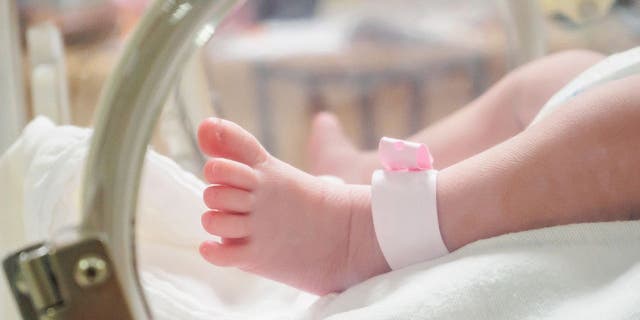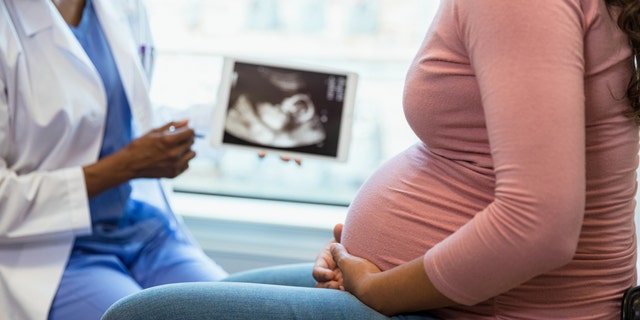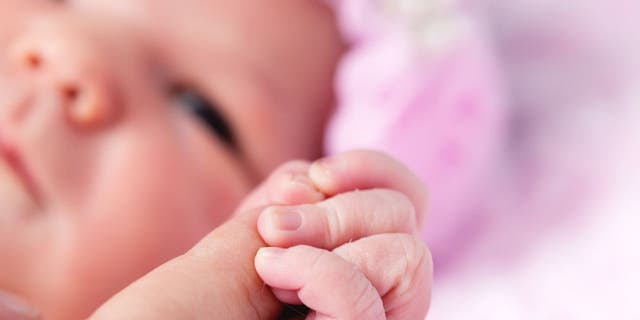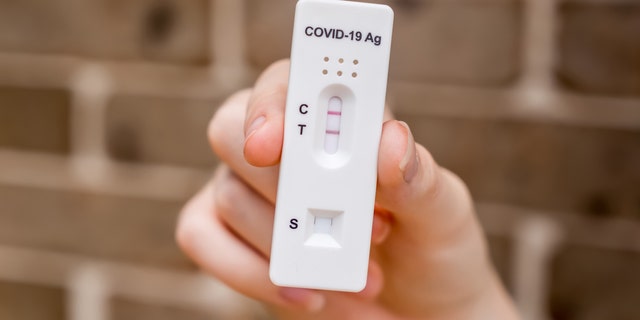Mothers passed COVID to babies through placenta, possibly causing brain damage, death
Two mothers who gave birth at Jackson Memorial Hospital in Miami, Florida, passed along the COVID-19 infection to their newborns through the placenta, researchers at the University of Miami Health System and the University of Miami Miller School of Medicine have found.
In both cases, the infection caused brain damage in the babies, according to a press release summarizing the findings from the study, which was published in the journal Pediatrics on April 6.
Although both babies tested negative for the COVID-19 virus at birth, they experienced “seizures, small head sizes and developmental delays,” the press release said.
COVID-19 VACCINE DOES NOT DAMAGE PLACENTA IN PREGNANCY, STUDY FINDS
One of the babies died suddenly at 13 months old.
Tests found that the babies had “significantly elevated SARS-CoV-2 antibodies” in their blood, which means either the antibodies crossed the placenta or the babies contracted the virus and produced their own antibodies.
The press release indicated that both pregnant women tested positive for COVID during their second trimesters, then recovered and tested negative.
Yet one of the women contracted the virus again during the third trimester.
This is the first study to show the transmission of COVID through the placenta resulting in brain damage in infants, the press release said.
Result not common among COVID pregnancies
Dr. Merline Benny, assistant professor of pediatrics and a neonatologist at the University of Miami, was the first author on the paper. She told Fox News Digital that she was surprised by the findings.
This was the first study to detect COVID crossing the placenta into a baby’s brain.
“The presence of the virus in the brain/organ of an infant had never been shown before,” she said. “The infants reported were two extreme cases we saw in the NICU [neonatal intensive care unit].”
COVID VACCINES ARE NOT NEEDED FOR HEALTHY KIDS AND TEENS, SAYS WORLD HEALTH ORGANIZATION
The hospital has had more than 350 infants born to COVID-positive mothers, and the vast majority of them were fine, Dr. Benny noted. Only a handful of the infants had any symptoms.
Dr. Ken Perry, an emergency physician in Charleston, South Carolina, was not involved in the study but reviewed the findings. He said the most surprising result was the fact that the outcome has been shown only in two patients.

“I do not believe this is a common finding that is occurring,” he told Fox News Digital.
“The findings of microcephaly [small head size], as well as low Apgar scores [a scoring system used to determine a newborn’s color and breathing] are not common. If they had become more common during COVID, this information would definitely have been shared across pediatric hospitals.”
He added, “This is a very concerning set of symptoms, especially if it can be directly connected with COVID.”
RECORD-BREAKING TWINS BORN FOUR MONTHS EARLY DEFY ODDS: ‘GOD WAS IN CONTROL’
Earlier in the pandemic, the researchers observed other, less severe issues — such as short-term lung disease and high blood pressure — in babies born to COVID-positive mothers.
In those cases, it wasn’t clear whether the problems stemmed from inflammation or from COVID crossing the placenta.
Researchers found ‘major brain changes’
In addition to signs of the virus and “severe inflammatory changes” in the two placentas, the researchers found “major changes” in the brain of the baby who passed away.

“I was struck by the unexplained severity of the loss of the white matter and the presence of features of hypoxia/ischemia in the cerebral cortex,” said Dr. Ali G. Saad, a Miller School professor, neuropathologist and director of the pediatric and perinatal pathology service at Holtz Children’s Hospital, in the press release discussing the findings.
“We became suspicious that the virus, somehow, managed to breach the placental barrier to damage the central nervous system, but this had not been documented before,” he added.
Parents should be aware but not panic
Dr. Benny reiterated that these two cases of brain injury were highly unusual.
“The vast majority of infants were asymptomatic, so we don’t want parents to panic,” she said. “This study was targeted at raising awareness among obstetricians, neonatologists and neurologists. However, it is important to conduct further research to study the long-term outcomes in these infants.”
“We don’t want parents to panic.”
If a mother is infected with COVID during pregnancy, Dr. Benny recommends monitoring for any developmental delays in the infants.
COVID VACCINE NASAL SPRAY SHOWS STRONG IMMUNE RESPONSE IN STUDY: ‘COULD BE A GAME CHANGER’
“If there are any developmental delays noted, they should report it to their pediatrician for further neurological and neurodevelopmental monitoring,” she said.
“The standard practice in our NICU is to screen all babies born to mothers who test positive with a respiratory swab for PCR [COVID test] starting at 24 hours of life.”

The biggest takeaway for pregnant women, Dr. Perry said, is to not become too nervous about these results.
“Pregnancy is stressful enough without adding another level of stress for pregnant mothers,” he said.
Small study calls causation into question
Given that there were only two infants involved in the study, Dr. Perry doesn’t think it’s necessary for patients to change their habits as of now.
“With these few patients, we are only able to discuss association rather than causation,” he said.
“There are some similarities between these patients that could account for these outcomes rather than COVID.”

He also said, “It is important for medical professionals to appropriately evaluate and integrate this data rather than change the normal standard of care. The best thing to do while pregnant is to ensure that mothers are getting appropriate prenatal care.”
For example, the study hypothesizes that the issues stemmed from inflammatory changes in the placenta.
“The best way to monitor this in utero is to have appropriate ultrasounds done to monitor the health of the placenta,” Dr. Perry said.
Researchers plan to investigate further
“At this time, we do not have much information on maternal COVID during pregnancy and its long-term effects on the infant into childhood and adolescence,” Dr. Benny told Fox News Digital.
“Conducting such studies into the long-term effects of COVID would be very important.”

Dr. Perry said this research should be followed by additional studies that include many more patients, allowing for better control of independent variables.
“This will allow for a discussion of causation to actually occur, which will guide recommendations going forward.”
CLICK HERE TO SIGN UP FOR OUR HEALTH NEWSLETTER
The researchers plan to look for the specific “biomarkers” that indicate babies who are at a higher risk of having adverse effects from maternal COVID.
Researchers recommend that pregnant women get the COVID vaccine.
To prevent any issues from occurring, the study authors recommend that all women get vaccinated against COVID-19 before or during pregnancy and that they practice “standard COVID precautions.”
Breastfeeding is also recommended as a means of boosting babies’ immunity, as COVID-19 antibodies have been found in breast milk.
Ultimately, Dr. Perry said the best option is for a patient to have a conversation with her doctor.
“Communicating with a physician who knows you is the best way to use the data within the study,” he said.
Read the full article Here


